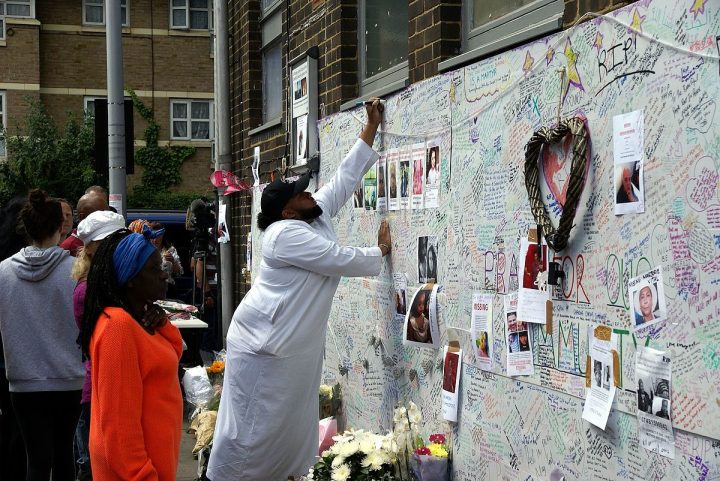Obsession with privatisation, fiscal austerity, deregulation, free trade, and reductions in government spending in order to increase the role of the private sector in the economy and society have been the neoliberal agenda pervading the world economic system since the 70s’ after Friedrich Hayek was given the Nobel Prize in Economics in 1974. Other main ideologists were Milton Friedman, James M. Buchanan and the disturbing promoter of selfishness Ayn Rand, along with politicians and policy-makers such as Margaret Thatcher, Ronald Reagan, Jacques Chirac, Pinochet’s “Chicago Boys” and Alan Greenspan.
As the UK mourns the victims of the horrendous fire that destroyed the Grenfell Tower in North Kensington, London, many are pointing out the factors that may have led to the catastrophe (the exact number of dead not yet clear but a local official said he hoped they would not “reach triple figures”).
The shrinking State: who can respond to catastrophes?
The US questioned this after Hurricane Katrina on August 29, 2005. It caused many deaths in Greater New Orleans due to levee and floodwall failure mainly due to a decision to use shorter steel sheet pilings in an effort to save money. It became abundantly clear that only the Public Sector could give a response and many government officials were criticized for theirs including President George W. Bush. The Federal Emergency Management Agency director had to resign. Wikipedia
Terrorism
In the UK the shrinking of the State by neoliberal governments (mainly Conservative but also “New Labour”), was raised after the Manchester suicide bomb. Reduction in police numbers due to austerity was suggested as a factor why the bomber had escaped surveillance in spite of his known extremist views. The emergency and health services giving response to the atrocity (and others that followed) had all been suffering progressive cuts. They were, however, committed to their roles and managed to rise to the challenge. To this day there is no suggestion that the Government is willing to review its policy and the Health Secretary who has presided of the progressive destruction of the NHS has been reappointed in the reshuffle after the General Election. A secret draconian plan to continue the onslaught on the Health Service has just been made public by The Guardian: “Leak shows ‘devastating’ impact of planned NHS cuts in London”
The Grenfell Tower inferno
The announced Public Enquiry may take several years to reach any conclusions. In the meantime enquiry-by-media is dripping information about the disaster, each new disclosure about possible causes adding to the horror:
- Safety guidelines. People were told by Management to stay in their flats until rescued by fire services. This advice assumed that fire services would be able to contain a fire within the building’s interior, which was impossible in this case as the fire was spreading rapidly via the building’s exterior.
- Previous warnings: Since 2013, the residents’ organisation, Grenfell Action Group (GAG), had repeatedly expressed concern about fire safety, and had warned the block’s management in November 2016 that only a catastrophic fire would finally force them to treat fire precautions and maintenance of fire-related systems properly.
- Building design: GAG had also said repeatedly that in the event of a fire, their escape path was limited to a single staircase.
- Management: the Tower was managed on behalf of the borough council by Kensington and Chelsea Tenant Management Organisation (KCTMO), following a now well established practice of “outsourcing” responsibility and financial decisions.
- Inequality: On 17 June 2017, MPs asked the council to explain why it had amassed £274 million of reserves, after years of underspending, and had not used any of its budget surplus to increase fire safety, given that residents had issued repeated warnings about the Grenfell Tower – housing poorer people than the rest of the borough – fire risk. The council also gave top rate council taxpayers a £100 refund rather than reinvesting the funds.
- Deregulation: Patrick Cockburn of The Independent criticised deregulation of the building industry by the government, which he described as “cutting red tape”. This was contrasted with the increasing complexity of processes faced by prospective benefits claimants including those with mental health issues. The Guardian: “Government-backed ‘red tape’ group looked at EU fire safety rules on morning of Grenfell fire. Red Tape Initiative considered push to dismantle regulations on construction materials including cladding after Brexit.”
- Flammable cladding: It became clear during the inferno that the recently installed outside cladding appeared to spread the fire at great speed. That type of cladding was the cheaper option at the time of refurbishment, containing flammable plastic inside an aluminium cover. Many countries had already banned it in buildings over 10 to 18 meters high. The chancellor claimed it is also banned in the UK.
Cuts to Fire Services, Police, Health Services and housing as part of the state-shrinking policy endanger lives. In response to well costed proposals during the recent electoral campaign by the Labour party the Government responded that “money does not grow on trees”. True but money does grow in the Tax Havens and Bank accounts of the rich.
According to the Sunday Times rich list In the past 12 months, the total wealth of Britain’s richest 1,000 individuals and families surged 14 percent to £658 billion ($854 billion, 777 billion euros),
No doubt “heads will roll” when a suitable scapegoat is found, manslaughter charges have already been announced when those responsible are identified, in order to assuage public anger with revenge rather than structural change. There is no mention though, at government level, that some of the most entrenched mantras of neoliberalism are now in question. What will it take?






